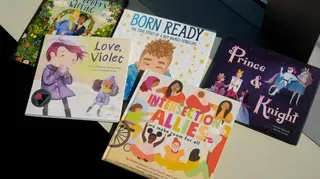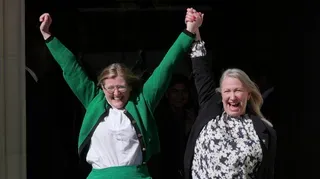July 12, 2012
Lutheran Church Welcomes LGBTs, Other D.C. Congregations Balk
Rachel Breitman READ TIME: 4 MIN.
For same-sex marriage advocates seeking official support from religious groups, waiting for a change in religious doctrine is much like watching an icicle melt. But that pace is picking up in the Lutheran Church. On July 7, the bishop of the Evangelical Church in America gave a keynote speech at a gathering of Lutheran LGBT advocates at the Luther Place Memorial Lutheran Church in Northwest, Washington, DC.
"Some have questioned why I have not been a stronger advocate for the changes adopted by the 2009 Church-wide Assembly," said Presiding Bishop Mark Hanson, to the Reconciling Works biennial general assembly.
He was referring to the three-year-old decision by the church to allow partnered lesbian and gay ministers to serve. Since then, the American Lutheran church lagged behind the Evangelical Lutheran Church in Canada, which voted in 2011 in favor of offering formal marriage rituals and blessings of same-gender couples.
"Why do we as a church body take years to develop social statements?" asked Hanson, as he addressed the group of nearly 200. "Because those are the complex issues with which we contend almost every day of our lives."
On July 9, Reconciling Works called upon Congress to pass legislation to protect their LGBT members from bullying in schools, to pass ENDA and prevent against employment discrimination, to repeal DOMA and to pass the Uniting American Families Act.
And gaining religious approval for same-sex nuptials has proved complex. On July 10, when the U.S. Episcopal Church became the biggest church in the country to approve a formal ritual blessing for same-sex unions at its national convention in Indianapolis, it came right in the middle of a season full of promise for reforms by organized religion. But not all that promise has come to fruition.
In May, the United Methodist Church concluded its general assembly without considering a vote on same-sex marriage. And on July 6, the Presbyterian Church's general assembly rejected a proposal to revise its definition of marriage to "a covenant between two people" by a vote of 338-308.
"The assembly rightly discerned that the church is not in the place to make those changes yet," remarked the Presbyterian Church's moderator, Reverend Neal Presa, of the narrow defeat, noting that the church will study the issue for two more years before revisiting it at the next convention. "The assembly wanted the church to breathe and think about this more."
Church Officials Move Forward, But Policy Doesn’t Keep Up
Adding to the frustration of near-loss for LGBT advocates within the Presbyterian Church, Presa's vice-moderator, Washington, D.C.-based Reverend Tara Spuhler McCabe, resigned her leadership position July 5 under pressure for having performed a same-sex marriage at National Capital Presbytery in April.
But Pittsburgh-area Reverend Janet Edwards, who had charges brought against her by the Presbyterian Church in 2005 for officiating at a same-sex commitment ceremony in Pennsylvania, said that she still feels hopeful that the church will eventually follow Episcopalians and the United Church of Christ with a formal endorsement of same-sex marriage rituals.
"It was delightful and surprising that the vote was this close," said Edwards. "It bodes well for the future."
For Jews supporting same-sex marriage, early June brought a success, when the Conservative Jewish Committee on Jewish Law and Standards approved same-sex marriage ceremonies. But Rabbi Elliott Dorff, the chairman of the committee, said he does not expect more traditional Orthodox Jews to follow suit.
"I doubt very much whether the Orthodox world will accept, let alone celebrate, gay or lesbian unions," said Dorff. He pointed to enormous criticism received by the token Orthodox Jews willing to officiate at same-sex commitment ceremonies. "Some of this is probably homophobia, but much more of it, I think, is based on the fundamentalist approach that the Orthodox take with regard to Jewish law."
And while some Christian congregations made incremental strides towards embracing marriage equality this summer, the Southern Baptist Church issued a harsh rebuke when it voted in its Nashville-based convention in June to chastise those who described same-sex marriage as a civil rights issue.
Reverend Eric Redmond, Executive Pastoral Assistant and Bible Professor in Residence at Washington, D.C.'s predominantly African American New Canaan Baptist Church, co-wrote the resolution, which passed resoundingly before an audience of more than 7,000.
In an open letter to the President of the United States, Redmond wrote, "There are no tenets that can be identified as Christian that allow for anyone to view homosexuality as acceptable."
Redmond says many in his congregation have taken offense at President Barack Obama's new stance on legalizing same-sex marriage.
"The president and public opinion leaders have co-opted this issue as a civil issue," said Redmond, "but marriage is something that has been standard across culture from thousands of years."
But while approval from more conservation religious groups seems clearly out of reach, some religious leaders say approval for same-sex marriage will come, not through tweaking religious doctrine, but by changing the ideas of the faithful, one person at a time.
"If Christian churches, such as the Presbyterians or Anglicans, take a more open stance on same-sex marriage, it will not influence the institutional Catholic Church's official stance on same-sex marriage," said Sister Jeannine Gramick, co-founder of the LGBT-welcoming New Ways Ministry. But she thinks that incremental changes will still influence the attitudes of congregants, noting that a recent study showing that already 43 percent of Catholics favor allowing gay and lesbian people to marry.
"Undecided Catholics will begin to rethink the issue as they see more of society becoming accepting," said Gramick.







